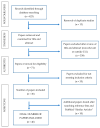Mentoring New and Early-Stage Investigators and Underrepresented Minority Faculty for Research Success in Health-Related Fields: An Integrative Literature Review (2010-2020)
- PMID: 33430479
- PMCID: PMC7826619
- DOI: 10.3390/ijerph18020432
Mentoring New and Early-Stage Investigators and Underrepresented Minority Faculty for Research Success in Health-Related Fields: An Integrative Literature Review (2010-2020)
Abstract
Mentoring to develop research skills is an important strategy for facilitating faculty success. The purpose of this study was to conduct an integrative literature review to examine the barriers and facilitators to mentoring in health-related research, particularly for three categories: new investigators (NI), early-stage investigators (ESI) and underrepresented minority faculty (UMF). PsychINFO, CINAHL and PubMed were searched for papers published in English from 2010 to 2020, and 46 papers were reviewed. Most papers recommended having multiple mentors and many recommended assessing baseline research skills. Barriers and facilitators were both individual and institutional. Individual barriers mentioned most frequently were a lack of time and finding work-life balance. UMF mentioned barriers related to bias, discrimination and isolation. Institutional barriers included lack of mentors, lack of access to resources, and heavy teaching and service loads. UMF experienced institutional barriers such as devaluation of experience or expertise. Individual facilitators were subdivided and included writing and synthesis as technical skills, networking and collaborating as interpersonal skills, and accountability, leadership, time management, and resilience/grit as personal skills. Institutional facilitators included access to mentoring, professional development opportunities, and workload assigned to research. Advocacy for diversity and cultural humility were included as unique interpersonal and institutional facilitators for UMF. Several overlapping and unique barriers and facilitators to mentoring for research success for NI, ESI and UMF in the health-related disciplines are presented.
Keywords: diversity; early career; faculty development; new faculty; underrepresented minority faculty.
Conflict of interest statement
The authors declare no conflict of interest.
Figures
References
-
- Cote J.E., Allahar A.L. Lowering Higher Education: The Rise of Corporate Universities and the Fall of Liberal Education. University of Toronto Press; Toronto, CA, USA: 2015.
-
- Grawe N.D. Demographics and the Demand for Higher Education. Johns Hopkins Press; Baltimore, MD, USA: 2018.
-
- Blumenstyk G. American Higher Education in Crisis? What Everyone Needs to Know. Oxford University Press; London, UK: 2015.
-
- Dennis M.J. Post-COVID-19 threats to higher education. Enroll. Manag. Rep. 2020 doi: 10.1002/emt.30712. - DOI
Publication types
MeSH terms
Grants and funding
LinkOut - more resources
Full Text Sources
Other Literature Sources
Miscellaneous


